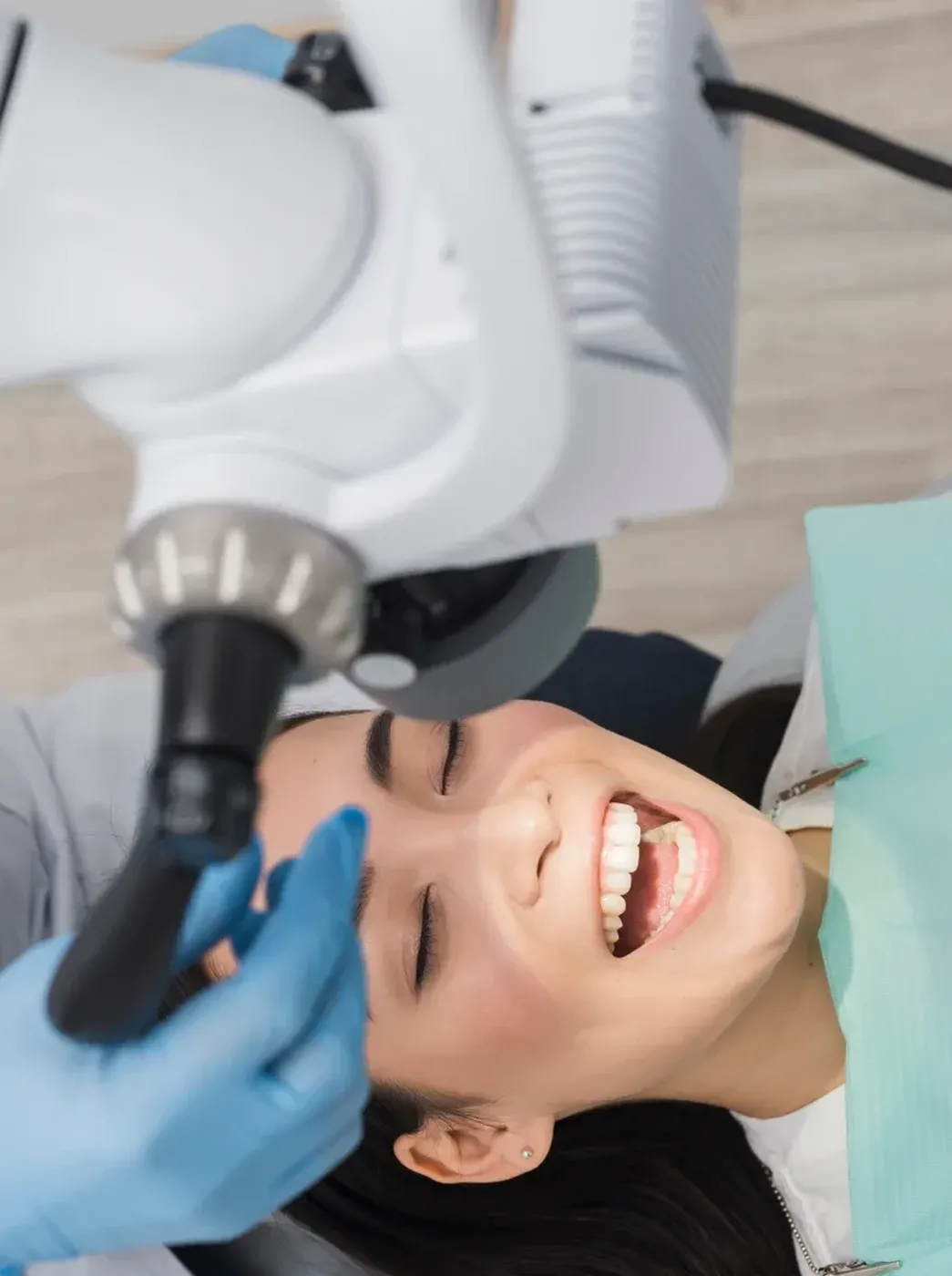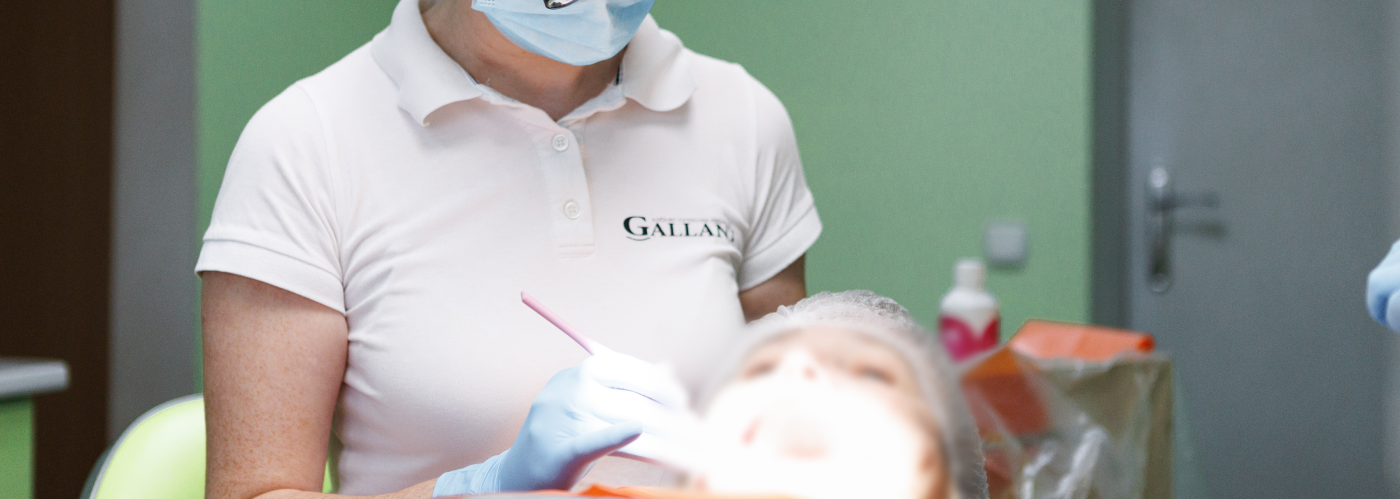
Metal-ceramic crowns
Metal-Ceramic Crowns at Gallant Dental Clinic
Today, there are many dental problems that can cause tooth destruction. One of the most effective ways to preserve teeth is the installation of crowns. They allow for complete restoration of the tooth’s shape and function. A metal-ceramic crown looks like a strong “cap” that covers the remaining part of the tooth and, in structure, color, and appearance, closely resembles a natural tooth.
Features of Metal-Ceramic Crowns
A metal-ceramic crown is a dental prosthesis whose base is made from a special metal alloy. It is designed to fully restore the function and appearance of a lost tooth. All crowns are made individually, taking into account the anatomical features of the patient. Such prostheses precisely replicate the shape of a natural tooth.
The outer part of the metal-ceramic crown imitates enamel and dentin, which makes the structure look as natural as possible. The crown consists of several layers of dental coating that undergo thermal processing, making it strong and durable.
The metal-ceramic crown is fixed using special dental cement. As a result, the patient receives a full tooth replacement that preserves not only functionality but also aesthetics.
Common metals used for crowns include nickel, chromium, cobalt, or gold-containing alloys. The ceramic coating closely matches natural teeth in color and shape, but it does not replicate the translucency characteristic of natural enamel.
Dentists most often recommend metal-ceramic crowns for molars and premolars because, over time, a metal rim along the gum line may become visible in the front teeth.
Advantages and Disadvantages of Metal-Ceramics
Nowadays, naturalness is in style. Instead of gold and silver shine in a smile, more people choose an aesthetic and reliable solution - metal-ceramic crowns. They combine the strength of metal with the natural look of ceramics, making them a popular prosthetic option.
Main advantages of metal-ceramic crowns:
- High strength and color stability over the years;
- Long service life;
- Reliable protection of the tooth under the crown;
- Resistance to staining from food and drinks;
- Quick adaptation — within a few days;
- No corrosion and resistance to bacteria;
- Good biocompatibility with oral tissues;
- Affordable price compared to all-ceramic options.
Despite the benefits, there are some factors to consider. Installing a crown may require significant tooth preparation and depulpation. In areas with a thin enamel layer (e.g., front teeth), slight translucency of the metal base or minor color differences compared to natural teeth can sometimes occur. However, modern materials from trusted manufacturers help minimise these risks.
There are also contraindications: metal allergies, chronic gum inflammation, bruxism, or active oral inflammatory processes. In such cases, specialists will help choose an alternative tooth restoration option.
How Metal-Ceramic Crowns Are Installed
Before installing a metal-ceramic prosthesis, a thorough oral examination is performed. If diseases or inflammation are detected, the doctor prescribes appropriate treatment. During the consultation, the prosthetic method and materials are selected. If the crown is installed on a living tooth, depulpation (nerve removal) is necessary to prevent complications. After problem elimination, the prosthodontist prepares the tooth for impression taking.
Tooth preparation for a metal-ceramic crown is usually similar to that for other types of crowns but has particular features during the formation of the stump, so it is better to entrust this procedure to experienced specialists.
Prostheses are made based on impressions, perfectly matching your tooth. Temporary crowns are installed to check compatibility with the natural tooth, followed by the permanent model installation. A frame is formed and covered with a ceramic layer after successful fitting and confirmation of ideal compatibility.
If the prosthetic procedure is complication-free and painless, the crown is fixed with strong cement. In case of defects or chips, restoration is done without removing the prosthesis. Installing a metal-ceramic crown at our clinic will ensure an ideal result: your smile will be aesthetic and healthy for many years.
Types of Metal-Ceramic Prostheses
There are several types of prostheses:
- Single crowns — fixed to a damaged tooth, used when the tooth is destroyed by no more than 60%.
- Bridge prostheses — used when it is necessary to restore a tooth or when the prosthesis cannot be attached to a single tooth. This structure is fixed to adjacent teeth after their preparation (including nerve removal).
- With shoulder margin — a metal-ceramic crown with a shoulder margin is installed on the front teeth. The shoulder helps to hide the metal base and improve aesthetics.
- Implant prostheses — crowns on implants are fixed to an abutment, which is convenient and effective, especially when only a tooth root remains where a post can be inserted.
The choice of the best prosthetic option is made by experienced prosthodontists at Gallant Dental Clinic. The price of metal-ceramic crowns depends on the type of structure and treatment specifics.
Service Life of Metal-Ceramic Prostheses
The service life of metal-ceramic crowns depends on several factors:
- Quality of the product;
- Conditions of crown care;
- Individual patient characteristics.
With proper care and following the doctor’s recommendations, a crown can last from 10 to 15 years. In some cases, the service life may be even longer. After this period, the crown should be replaced. If any discomfort or changes in the prosthesis occur, it is necessary to consult the doctor for examination and treatment.
Contraindications to Metal-Ceramic Crown Installation
When choosing a prosthetic method, it is important to consider that metal-ceramic crowns are not suitable for all patients. There are several factors that can contraindicate this type of prosthetics:
- Significant destruction of tooth tissues;
- Presence of caries or periodontal disease on the supporting teeth;
- Allergy to metals used in the crown structure.
However, do not despair if you have contraindications to metal-ceramic crowns. Modern dentistry offers many other methods and technologies for tooth restoration, among which the most suitable option can be chosen for each patient.
At Gallant Dental Clinic, you can receive a quality consultation, choose the best prosthetic option, and find out the exact cost of services.
Request a call
We will contact you to schedule a convenient time for your consultation and connect you with the right specialist
How long do metal-ceramic crowns last?
The lifespan of metal-ceramic crowns can reach 10–15 years.

How should you care for metal-ceramic crowns?
Care for metal-ceramic crowns should be the same as for natural teeth: brush your teeth at least twice a day with a toothbrush and toothpaste, rinse your mouth with water after every meal, and don’t forget to use mouthwash, dental floss, and interdental brushes of the appropriate size.

What are the indications for installing metal-ceramic crowns?
- Restoration of severely damaged or decayed teeth
- Protection of teeth after endodontic treatment (root canal therapy)
- Restoring chewing function and the aesthetic appearance of teeth
- Preparation for the placement of dental bridges

What are the advantages of a metal-ceramic crown?
This type of crown is one of the most popular due to its reliability, high aesthetics, and relatively affordable cost. Our experienced prosthodontists use advanced technologies to create metal-ceramic crowns tailored to the individual needs of each patient.

Testimonials
I have been receiving dental treatment at Gallant Dental Clinic for a long time, with many visits. I’m always warmly greeted by the friendly receptionist, Alyona, who helped me find a convenient schedule. The clinic has a very pleasant atmosphere, and everyone is very kind. They use modern equipment. Special thanks to my dentist, Dr. Natalia Verpeta, for her friendliness, professionalism, and high-quality treatment with minimal discomfort. She is my favorite doctor. I’m also very grateful to the always friendly prosthodontist, Dr. Vasyl Volodymyrovych, for his professionalism and excellent work. The atmosphere is welcoming, and the service is great. The assistants are also wonderful - attentive and precise in their work. Thank you all very much. Wishing you continued success!


Request a call
We will contact you to schedule a convenient time for your consultation and connect you with the right specialist

Request a call
We’ll get back to you shortly!

Leave a Review
Your feedback means a lot to us!


